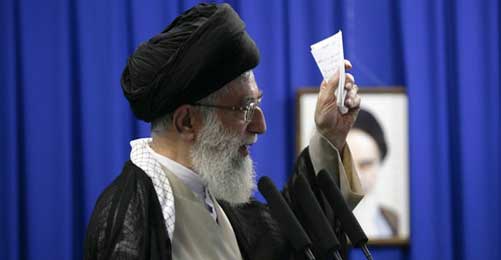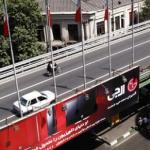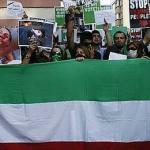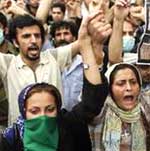
The desires of the hundreds of thousands of Iranian protestors who took to the streets following the election results must be put on hold, according to the country's top cleric Ayatollah Ali Khamenei. Delivering a rare sermon at Friday prayer from Tehran University Khamenei said that the "protests must stop." It was a stern warning to anyone who may be considering otherwise.
This will come as a blow to those who believe that the election results were fixed. Protests have continued daily since the results gave the incumbent Mahmoud Ahmedinejad a majority win over his main rivial Mir Hossein Mousavi. The historic displays of public opposition had gathered momentum over the past two days, but whether this can be preserved and encouraged now seems increasingly uncertain.
Khamenei has now quashed any ambiguity about the country's presidential vote by firmly backing Ahmedinejad in front of thousands of worshippers by addressing the claims of vote rigging. "There was a difference of 11 million votes between Ahmedinejad and Mousavi, how can such a margin be rigged." He also said that all complaints should be lodged through legal means and that he would not accept "illegal innovations", before declaring the election competition was "now over."
How this will go down with the hundreds of thousands of "green" protestors remains to be seen. Will they accept defeat as has been now commanded by the country's supreme leader, or will they challenge this further. All three defeated candidates were invited to meet with The Guardian Council on Saturday, however, according to state media Rezai attended the Guardian Council meeting but Mousavi and Karoubi didn't.making it clear that they have lost all faith in the legal mechanism to protect their complaints.
Although voicing his staunch support for Ahmendinejad, Khamenei criticized the tenth president of the Islamic republic for his allegations against Ayatollah Rafsanjani, whom he praised at length and called a "pillar of the revolution". An olive branch perhaps to the Mousavi camp who is backed by the equally powerful cleric. Rafsanjani is associated with the Iranian business class, and is viewed as a pragmatic conservative who supports a centrist position domestically and seeks to avoid conflict with the US. During the election campaign Ahmedinejad repeatedly accused Rafsanjani of corruption in a series of open televised debates. This had a powerful effect on Iranians who want to lessen the disparity between rich and poor.
Khamenei openly defended his clerical peer and main opposition personally: "I have know this man for 52 years and he has required his wealth via his position." This election, as an Iranian friend was quick to state, was rather about politics than the people's desires. This election exposed deep rifts within the country's power structure itself.
But, are these rifts deeper than we think? Is there a struggle for clerical leadership in Qom itself - the spiritual centre of Shia Islam. Ayatoallh Khomeini, leader of the Islamic revolution, ruled the Islamic republic from 1979 until his death in 1989 from the city north of Tehran. Ahmedinejad enjoys popular support in Qom, as he does among the more pious Iranians.
This personal backing of Rafsanjani by Khameini was a public call for unity by the supreme leader, or is it? Perhaps a reasserting of power over any rivals who may consider challenging the Islamic leadership. The parliamentary elections or Majlis elections in 2008 saw conservatives win over the reformists guaranteeing a continuation of the constitutional status quo - this safe-guards the leader's position itself. Any type of western-style democratic reforms would demand radical constitutional reforms, a sensitive topic. The constitution in the minds of millions of Iranians guarantees their own sovereignty, it's a dilemma the leadership is going to have to face sooner or later with a growing desire for more liberties by young Iranians. Over 60% of the country's population is under the age of 35.
To know where Iran will go next in terms of foreign policy is equally hard to predict. Khamenei blamed external interference for the riots that followed the elections in which 7 people died, that was the official number - an Iranian human rights activist posted 32 as the number of dead on facebook. He also blamed the UK for its meddling, this being a swipe at the BBC's coverage of the Iranian elections and the days that followed. And while BBC Persia definitely has a roll to play in giving a voice to those students who were terrorized by government sponsored militia - videos from Isfahan University circulated on YouTube spoke for themselves, bloodied students being carried from dorms where clashes took place - it also failed to understand what was happening within an Iranian context, and slated Mousavi's green movement protests as an orange type revolution rather than a legal challenge to the election results, the Guardian Council has lodged over 600 violations by the opposition and invited this to be settled legally through an investigation.
The dressing down of western media may seem to be totally out of context and a propaganda tool, but the fact that hundreds of expat Iranians who voted in polling stations set up in the UK protested outside the BBC centre in London speaks for itself. Both Ahmedinejad and Mousavi supporters came out to complain about the BBC's coverage saying that it was provocative. Whether these complaints are entirely well-informed is also open to question, but one can't deny Iranians who participated in the presidential polls living in the UK, an opinion on the media coverage there. The one undeniable revolution that did come out of this was that political activism in Iran has been born through alternative media such as twitter, facebook, YouTube, and this has left a profound effect on the world media which ever country it belongs to. Citizen journalism via cell phone videos uploaded on to YouTube told the story that many international journalists just simply couldn't gain access to.
The misunderstandings that litter Iran's relation with the west and vice versa unfortunately gives credence to the anti-western rhetoric of the Islamic revolution itself as demonstrated by thousands of worshippers chanting "down with the UK, down with US," after the Khameini's sermon called the UK the "most treacherous county" in the world. How this will bring about the types of reconciliation with the west Obama is hoping for is difficult to gage.
Security remains tense in the Iranian capital following the speech, reports of truck loads of riot police moving around the city are already surfacing. This will be worrying to opposition members after Khamenei said, "whatever happens, the responsibility will be on those who did not listen and ruin the celebration of Iranian people."
Faced with a renewed mandate by security services to crackdown as they see fit, Mousavi and his supporters will be have to make a tough decision. Do they continue their protest or accept their fate for the next four years. Hundreds of opposition members and supporters have already been arrested and it seems that after these stern words the arrests will continue.
Khamenei has approved a recount of the disputed votes, as demanded by those defeated in the June 12th poll. But whether they will persist with this request following Friday's sermon is not clear. The country's supreme leader has made his opinion crystal clear with regards to who will rule as president for the next four years, which in an Iranian context is as good a being written into law.(AM/EK)







